〖人教版〗九年级英语全一册单元导学案集
英语人教版九年级全册导学案

Unit 2 I think that mooncakes are delicious.Period One (Section A 1a-dc)教学目标◆知识目标A.重点单词:mooncake,stranger,relative,poundB.重点词组: 1 .put on 2. the Water Festival 3 .the Dragon Boat Festival 4. the Lantern Festival 5. be similar to 6. eat outC.重点句式:1 .Bill thinks that the races were not that interesting to watch.2 .Bill wonders whether they will have zongzi again next year.3 .I guess the food was delicious,right?4. I wonder if it's similar to the water festival of the Dai people in Yunnan Province.◆能力目标运用宾语从句来谈论各地的重大节日。
◆情感目标了解中华传统文化,弘扬中华民族精神,激发学生爱我中华的热情。
课前预习:一、通过背诵P9-10的单词,自学1a-2c的相关内容,关上书完成下列各题:A:单词过关:灯笼_____________陌生人______________亲属,亲戚_____________磅,英镑_____________ B:短语过关:增加(体重)发胖_______________________ 一点儿拥挤______________________看(龙舟)比赛_______________________ 明年_______________________在外面吃饭_______________________ 一日五餐_______________________C:句子过关:1. 多美好的一天。
Unit4Iusedtobeafraidofthedark.导学案人教版英语九年级全册(1)

Unit 4 I used to be afraid of the dark.Section A【学习目标和重点、难点】1.熟练运用used to do sth.谈论自己、他人过去的习惯、爱好、形象及经常做的事情。
2.能够听懂有关学习方法的简短对话。
3.能运用used to来谈论过去。
【学习内容及学习过程】(一)要点导学导学①I used to be afraid of the dark .used to do sth.过去常常做某事。
用于过去式中, 表示现在已不存在的习惯或状态。
查阅资料,掌握used to的用法。
跟踪练习(1) He______ ______ ____________ after school. 放学后他过去常常踢足球。
(2) He ____ ______ _____ ___________________________. 他过去不吸烟。
(3)He used to play football. (改为一般疑问句,再回答)_____________________________________________________________________拓展:be/get used to doing sth 意思是“习惯做某事”;be used to do sth和be used for doing sth表示“被用来做什么”。
导学②You used to be short, didn’t you? 复习反意疑问句,完成练习:Lily will go to China, ______ _____?She doesn’t e from China, ________ ________?(3) You haven’t finished homework, _________ __ ?(4) He knows little English, _________ ______?导学③区别下面两句的意思:跟踪练习(1) 我记得给花浇过水了。
Unit7第1课时(SectionA1a2d)(导学案)九年级英语全一册(人教版)
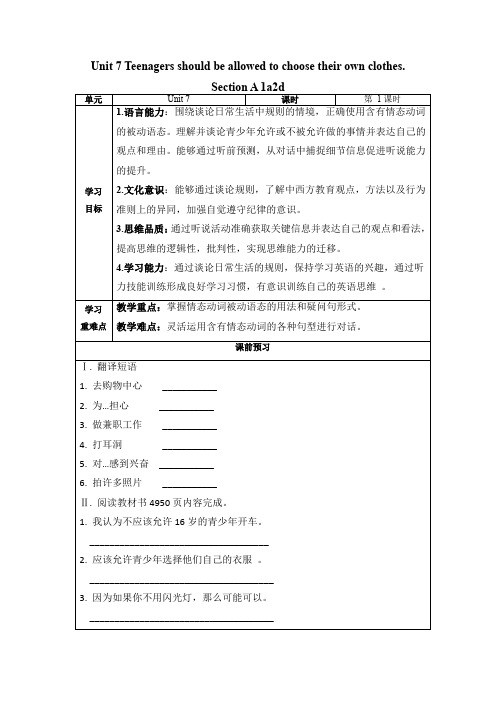
Unit 7 Teenagers should be allowed to choose their own clothes.二. summary1.对...感到兴奋.2.照很多照片.3.在博物馆不被允许.4.使用闪光灯.5.保护油画.6.对于观赏毕加索的著名油画我感到兴奋。
随堂速练二. 单项选择1. Our parents won’t allow us _______ in the river alone.A. swimB. to swimC. swimmingD. swam2.—I am a little nervous every time I take exams.—Don't worry. Just try your best. , grades are not everything.A. After allB. As a resultC. In the same way3.—That machine is broken. It tomorrow.A. repairedB. was repairedC. will repairD. will be repaired4. It is ______ to work out this problem. You needn’t go to the teacher.A. enough easyB. easily enoughC. easy enoughD. very easily5.The young man is ______ to carry the heavy box.A. enough strongB. strong enoughC. too strongD. so strong6. He did not write_____, thought he had _____.A. careful enough; enough timeB. carefully enough; enough timeC. enough careful; enough timeD. enough carefully; time enough参考答案课前预习Ⅲ. 1. go to the shopping center 2. be worried about3. have parttime job4. get ears pierced5. be excited about6. take a lot of photosⅢ. 1. I think sixteenyearolds should not be allowed to drive.2. Teenagers should be allowed to choose their own clothes.3. If you don’t use a flash, then it will be OK.Ⅲ. 1. teenagers 2. license 3. excited 4. smoking 5. safety二、BACFFTTF随堂速练二.BADCBB三。
人教版九年级上册英语全册导学案(学生用用2023年秋修订)

人教版九年级上册英语全册导学案(学生用用2023年秋修订)第一单元:你是谁?课前预1. 阅读课文《Unit 1 You're a student, aren't you?》。
2. 复和掌握课文中的重点词汇和短语,包括"student"、"have"、"class"等。
3. 预测和讨论课文的主要内容和可能的问题。
课堂研究1. 听读课文《Unit 1 You're a student, aren't you?》。
2. 跟读课文,注意语音语调和语速。
3. 完成课文中的练题,加深对课文的理解。
课后作业1. 背诵和默写课文中的重点句子。
2. 扩展课文中的对话,用自己的话描述一下自己是谁,并询问对方的身份。
3. 总结课文中的语法知识点,如否定句和一般疑问句的构成。
第二单元:我的课程课前预1. 阅读课文《Unit 2 What classes do you have?》。
2. 复和掌握课文中的重点词汇和短语,包括"course"、"like"、"math"等。
3. 预测和讨论课文的主要内容和可能的问题。
课堂研究1. 听读课文《Unit 2 What classes do you have?》。
2. 跟读课文,注意语音语调和语速。
3. 完成课文中的练题,加深对课文的理解。
课后作业1. 背诵和默写课文中的重点句子。
2. 用英语列举出你所上的课程,并描述你对每门课程的感受。
3. 总结课文中的语法知识点,如可数与不可数名词的用法。
第三单元:我的家人课前预1. 阅读课文《Unit 3 My family》。
2. 复和掌握课文中的重点词汇和短语,包括"family"、"sister"、"father"等。
3. 预测和讨论课文的主要内容和可能的问题。
(共4套)人教版九年级英语全一册单元导学案集
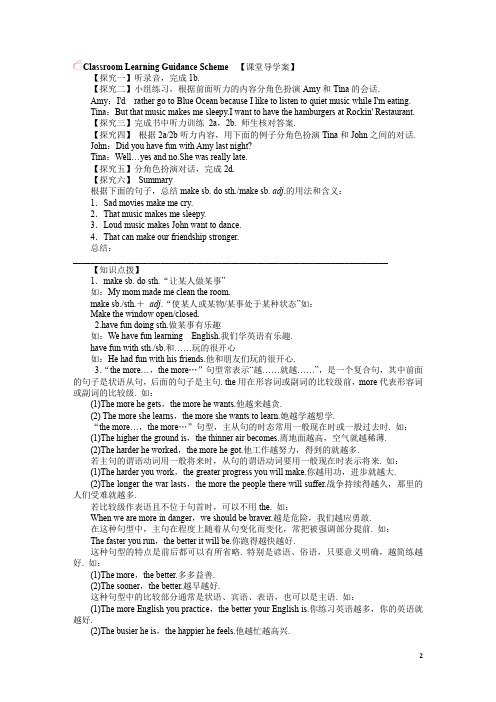
(共4套)人教版九年级英语全一册单元导学案集Unit 11Sad movies make me cry.第一课时Section A(1a-2d)Target Navigation【目标导航】Key words and phrases:drive,drive sb. crazy/mad,the more…the more…,lately,be friends with(sb.),leave out,friendshipKey sentences:(1)Sad movies make me cry.(2)I'd rather go to Blue Ocean because I like to listen to quiet music while I'm eating.(3)Waiting for Amy drove Tina crazy.(4)The more I got to know Julie,the more I've realized that we have a lot in common.(5)It makes Alice unhappy because she thinks Julie is now better friends with me than with her.Skills:初步学会谈论事情如何影响你,并表达个人主观感受.Emotion:通过互相谈论“周围的环境或事情如何影响你”,使学生相互了解彼此的内心需求和烦恼,从而培养学生学会关心别人,为别人着想.The guidance of learning methods【学法指导】通过听、说等一些活动培养良好的听力习惯和能力,再通过独学和小组合作,学会把握学习的主要内容,在学习中善于记要点,善于抓住用英语进行交际的机会.Learning important and difficult points【学习重难点】学会运用make sb. do sth./make sb.+adj.的结构表达“某事使某人怎么样”.Teaching Steps【教学过程】Autonomous Learning Scheme【自主学习方案】☞预习指导与检测(一)预习指导1.预习Page 81、82的生词,根据音标会读知意.2.朗读Page 81、82的句子,能英汉互译.(二)预习检测Ⅰ.完成下列短语.1.使某人发疯/发狂________________2.不完全是________________3.与……玩的开心________________4.(性格、爱好等)有相同之处________________5.越……越……________________6.忽略,不包括,不提及________________7.是某人的朋友________________8.听轻音乐________________9.一起度过更多时光________________(Keys:1.drive sb. mad/crazy;2.yes and no;3.have fun with…;4.have…in common;5.the more…the more…;6.leave out;7.be friends with sb.;8.listen to soft music;9.spend more time together)Ⅱ.完成书中第81页1a的练习.Classroom Learning Guidance Scheme【课堂导学案】【探究一】听录音,完成1b.【探究二】小组练习,根据前面听力的内容分角色扮演Amy和Tina的会话.Amy:I'd rather go to Blue Ocean because I like to listen to quiet music while I'm eating.Tina:But that music makes me sleepy.I want to have the hamburgers at Rockin' Restaurant.【探究三】完成书中听力训练2a,2b. 师生核对答案.【探究四】根据2a/2b听力内容,用下面的例子分角色扮演Tina和John之间的对话.John:Did you have fun with Amy last night?Tina:Well…yes and no.She was really late.【探究五】分角色扮演对话,完成2d.【探究六】Summary根据下面的句子,总结make sb. do sth./make sb. adj.的用法和含义:1.Sad movies make me cry.2.That music makes me sleepy.3.Loud music makes John want to dance.4.That can make our friendship stronger.总结:________________________________________________________________________【知识点拨】1.make sb. do sth.“让某人做某事”如:My mom made me clean the room.make sb./sth.+adj.“使某人或某物/某事处于某种状态”如:Make the window open/closed.2.have fun doing sth.做某事有乐趣如:We have fun learning English.我们学英语有乐趣.have fun with sth./sb.和……玩的很开心如:He had fun with his friends.他和朋友们玩的很开心.3.“the more…,the more…”句型常表示“越……就越……”,是一个复合句,其中前面的句子是状语从句,后面的句子是主句. the用在形容词或副词的比较级前,more代表形容词或副词的比较级. 如:(1)The more he gets,the more he wants.他越来越贪.(2) The more she learns,the more she wants to learn.她越学越想学.“the more…,the more…”句型,主从句的时态常用一般现在时或一般过去时. 如:(1)The higher the ground is,the thinner air becomes.离地面越高,空气就越稀薄.(2)The harder he worked,the more he got.他工作越努力,得到的就越多.若主句的谓语动词用一般将来时,从句的谓语动词要用一般现在时表示将来. 如:(1)The harder you work,the greater progress you will make.你越用功,进步就越大.(2)The longer the war lasts,the more the people there will suffer.战争持续得越久,那里的人们受难就越多.若比较级作表语且不位于句首时,可以不用the. 如:When we are more in danger,we should be braver.越是危险,我们越应勇敢.在这种句型中,主句在程度上随着从句变化而变化,常把被强调部分提前. 如:The faster you run,the better it will be.你跑得越快越好.这种句型的特点是前后都可以有所省略. 特别是谚语、俗语,只要意义明确,越简练越好. 如:(1)The more,the better.多多益善.(2)The sooner,the better.越早越好.这种句型中的比较部分通常是状语、宾语、表语,也可以是主语. 如:(1)The more English you practice,the better your English is.你练习英语越多,你的英语就越好.(2)The busier he is,the happier he feels.他越忙越高兴.(3)The more air there is inside the tyre,the greater pressure there is in it.轮胎里空气越多,承受的压力就越大.若表示“越……越不……”时,常用“the more…,the less…”句型. 如:The more she flatters me,the less I like her.她越逢迎我,我越不喜欢她.若表示“越不……就越……”时,常用“the less…,the more…”句型. 如:The less he worried,the better he worked.他越不烦恼,工作就干得越好.4.yes and no(对问题的一种两可回答)既肯定又否定,既是又不是,既好又不好. 如:“Yes and no,”he says.“不完全是,”他说.Classroom Evaluation Scheme【课堂评价案】详见当堂训练部分(即学生用书同步练习题).Teaching Reflection【教学反思】这一节课我们通过听说等活动,以及学生的自主学习和小组合作初步学习用make sb. adj./do sth.的结构表达某事对某人产生影响. 通过互相询问或谈论某事如何影响某人,使学生相互了解彼此的内心需求和烦恼. 从而培养学生学会关心别人,为别人着想. 在这一节课里,学生应该掌握的drive,drive sb. crazy/mad,the more…the more…,lately,be friends with (sb.),leave out,friendship等重点词汇和(1)Sad movies make me cry.(2)I'd rather go to Blue Ocean because I like to listen to quiet music while I'm eating.(3)Waiting for Amy drove Tina crazy.(4)The more I got to know Julie,the more I've realized that we have a lot in common.(5)It makes Alice unhappy because she thinks Julie is now better friends with me than with her.等重点句子都在本节课中顺利完成,收到了很好的效果.第二课时Section A(3a-4b)Target Navigation【目标导航】Key words and phrases:king,power,prime,minister,banker,pale,queen,call sb. in,examine,nor,neither…nor…,palace,wealth,to start with,grey,lemon,uncomfortableKey sentences:(1)The loud music makes me nervous.(2)Soft and quiet music makes me relax.(3)Money and fame don't always make people happy.(4)She said that the sad movie made her cry.Skills:进一步运用Grammar Focus的句型谈论事情如何影响你;同时通过阅读故事让学生讨论什么能真正使人开心,提高学生阅读理解能力.Emotion:通过阅读故事使学生真正从生活中找到什么能使人开心快乐.The guidance of learning methods【学法指导】任务型阅读方法的运用;通过练习、调查、谈论,熟练运用目标语言.Learning important and difficult points【学习重难点】1.任务型阅读“The Shirt of a Happy Man(Part I)”2.进一步熟练运用目标语言.Teaching Steps【教学过程】Autonomous Learning Scheme【自主学习方案】☞预习指导与检测(一)预习指导1.预习Page 83、84的生词和短语,根据音标会读记.2.朗读Grammar Focus的句子,并会用它们谈论事情如何影响你.(二)预习检测完成下列短语.1.很久以前________________2.睡眠很差________________3.feel like eating________________4.首相、大臣________________5.取代某人的位置________________6.高级将领________________7.起初,开始时________________8.在……做得好________________9.考试答题________________10.发回________________11.清扫街道________________(Keys:1.a long time ago;2.sleep badly;3.想要吃;4.prime minister;5.take one's position;6.top general;7.to start with;8.do well in…;9.answer the exam questions;10.hand back…;11.clean up the streets)Classroom Learning Guidance Scheme【课堂导学案】【探究一】小组合作完成3a/3b/3c的阅读练习.1.读故事回答3a的问题.2.从故事中找出与3b中这些短语意思相似的单词或短语.3.与你的小组分角色扮演这个故事.【探究二】同桌互查Grammar Focus中句子的背写情况.【探究三】小组合作完成4a的练习,学会运用“make sb. adj.”.【探究四】完成这个调查,然后再问两个学生:A:What makes you angry?B:When people throw rubbish on the streets,it makes me angry.C:Me,too.It makes me want to tell them to clean up the streets.Classroom Evaluation Scheme【课堂评价案】详见当堂训练部分(即学生用书同步练习题).Teaching Reflection【教学反思】这一节课我们通过任务型阅读活动,使学生真正了解了什么才能使人开心、快乐,药物、权力、金钱、名誉都不能使人开心. 学生通过自主学习和小组合作,完成填空练习和小调查,从而学会运用make sb. adj./do sth.. 在这一节课里,学生主要学习了king,power,prime minister,banker,pale,queen,call sb. in,examine,nor,neither…nor…,palace,wealth,to start with,grey,lemon,uncomfortable等重点单词和短语,并且能够运用重点句子根据小调查谈论某事如何影响某人,同时学生们还根据Grammar Focus总结了Section A的重点句型,收到了很好的效果.第三课时Section B(1a-1e)Target Navigation【目标导航】Key words and phrases:general,power,search for,even though,fame,return toKey sentences:(1)The general finds a happy person with power and money.(2)The general searched for three days and found a happy person.(3)What made the poor man so happy even though he had no power,money or fame?(4)Do you think the general will return to the king with the poor man's shirt?Skills:1.能够通过听录音理解“The Shirt of a Happy Man(Part Ⅱ)”的故事内容.2.能用目标语言讨论那个穷人关于快乐的想法.Emotion:通过听力理解“The Shirt of a Happy Man(Part Ⅱ)”的故事内容,并让学生通过讨论理解快乐的真正含义.The guidance of learning methods【学法指导】听说法、小组合作、讨论法.Learning important and difficult points【学习重难点】1.能够通过听录音理解“The Shirt of a Happy Man(Part Ⅱ)”的故事内容.2.能用目标语言讨论那个穷人关于快乐的想法.Teaching Steps【教学过程】Autonomous Learning Scheme【自主学习方案】☞预习指导与检测(一)预习指导复习Page 83的生词和短语.(二)预习检测Ⅰ.翻译.1.把他的衬衫给国王穿________________2.搜索、搜查________________3.即使________________4.返回到________________5.那个穷人关于幸福的想法________________(Keys:1.give his shirt to the king to wear;2.search for;3.even though;4.return to;5.the poor man's thoughts about happiness)Ⅱ.1a:Look at the possible endings to the story about the unhappy king.Do you think any of these is the right one?If so,which one?Ⅱ.1b:What are some other possible endings to the story?Discuss your ideas with your partner.Classroom Learning Guidance Scheme【课堂导学案】【探究一】完成1c,1d的听力训练.【探究二】你同意那个穷人关于快乐的想法吗?与你的组讨论你的想法. 然后分角色扮演故事的其余部分.Classroom Evaluation Scheme【课堂评价案】详见当堂训练部分(即学生用书同步练习题).Teaching Reflection【教学反思】本节课我们通过听和说的活动继续进一步学习了故事“The Shirt of a Happy Man”的剩余部分,重点复习了单词和短语general,power,search for,even though,fame,return to以及句子The general finds a happy person with power and money.The general searched for three days and found a happy person.What made the poor man so happy even though he had no power,money or fame?Do you think the general will return to the king with the poor man's shirt?学生通过这一节课的学习,已经基本掌握了本节课的重点词汇,能用目标语言讨论那个穷人关于快乐的想法,理解了快乐的真正含义. 我觉得在合作探究方面,通过小组合作学习,学生说英语的胆子越来越大,组与组之间的比赛,激发了学生听课的积极性和学习的欲望,注意力更加集中了,因而学习的效率更高了.第四课时Section B(2a-2e)Target Navigation【目标导航】Key words and phrases:weight,shoulder,goal,let…down,coach,kick,kick sb. off,be hard on sb.,besides,teammate,courage,rather than,guy,pull,relief,nod,agreement, fault,disappoint Skills:能够熟练地朗读课文,在阅读中,学会了解成语和短语的意思,学会带着问题有目的地进行阅读.Emotion:通过本节课的学习让学生学会与同桌分享自己快乐和悲伤的经历,学会交流,学会从失败中寻找自信,学会向错误学习.The guidance of learning methods【学法指导】任务型阅读、背记成语和动词短语.Learning important and difficult points【学习重难点】在阅读中,学会认识惯用语和动词短语,学会带着问题有目的地进行阅读.Teaching Steps【教学过程】Autonomous Learning Scheme【自主学习方案】☞预习指导与检测(一)预习指导1.预习Page 86、87的生词和短语,根据音标会读记.2思考:你曾经犯过错误吗?它使你感觉怎么样?与你的同桌谈论所发生过的事情,完成2a的练习.(二)预习检测根据86页2b完成下列英汉互译.1.注视________________2.生命中最糟糕的一天________________3.校足球场________________4.miss scoring that goal________________5.使……失望________________6.开除________________7.be too hard on oneself________________8.团队的努力________________9.向你的错误学习________________10.与……交流________________11.而不是________________12.齐心协力、通力合作________________13.To his surprise and relief,his teammates all nodded in agreement.________________________________________________________________________14.Besides,winning or losing is only half the game.________________________________________________________________________15.But I think if we continue to pull together,we're going to win the next one.________________________________________________________________________(Keys:1.keep one's eyes on…;2.the worst day of one's life;3.the school soccer field;4.错过进球;5.let…down;6.kick sb. off;7.对自己太苛刻;8.team effort;9.learn from your mistakes;municate with…;11.rather than;12.pull together;13.使他吃惊和得以解脱的是他的队友都同意地点点头. 14.而且,输赢仅仅是比赛的一半. 15.但我认为如果我们继续齐心协力,我们将赢下一场比赛. )Classroom Learning Guidance Scheme【课堂导学案】【探究一】小组讨论,阅读第86页2b短文,完成2b的阅读练习(读故事按正确的顺序给事件标号).【探究二】同桌互动,再读故事回答问题,完成2c的练习.【探究三】从故事中找出惯用语和短语替换这些句子中划线的部分,完成2d的练习.【探究四】分角色扮演皮特和他父亲的会话,完成2e的练习.【知识点拨】1.stop to do停下来去做另一件事. 如:I stop to have a rest.She stops to listen to the teacher.stop doing停止正在做的事. 如:We stopped talking when the teacher came in.Stop playing! Let's begin our class.2.let down使失望同义词:disappoint,get down,bring down,lower,take down反义词:elevate,get up,bring up,lift,raiselet down的英语解释:fail to meet the hopes or expectations of somebody;move something or somebody to a lower position3.rather…than…和rather than实际上是一样的,同would 连用时,可分开写,也可合写.would rather do A than do B=would do A rather than do B “宁愿……而不愿……”如:She would rather stay at home than go out.=She would stay at home rather than go out.但同prefer连用时,只能合写成:prefer to do A rather than do B “宁愿……而不愿……” 如:He preferred to die rather than surrender to the enemy.他宁死也不愿向敌人投降.单独使用时,rather than“而不是”. 如:This argument aimed at the understanding rather than the emotions.这场辩论针对的是理解而不是感情.Classroom Evaluation Scheme【课堂评价案】详见当堂训练部分(即学生用书同步练习题).Teaching Reflection【教学反思】本节课是一节阅读课,这节课通过引导学生阅读文段,完成阅读理解题,一方面学会带着问题有目的地阅读,另一方面学会记住成语和动词短语. 一节课下来学生基本上能够熟练地朗读课文. 这节课由于我在课前精心设计好阅读的思路,课堂上再通过由浅入深的问题引导,这样就一步步地完成了阅读的任务.第五课时3a-Self CheckTarget Navigation【目标导航】Knowledge goals:(1)学会根据提示用使自己感觉快乐和悲伤的经历写故事.(2)运用make sb. adj.句式熟练地谈论某事如何影响你的话题.(3)掌握并运用关于某事如何影响你的短语.Skills:能够熟练地运用本单元的重点句型和语法点.Emotion:通过本节课的学习,了解某事如何影响你的用语,并通过交流写作让学生明白他们什么样的经历最重要.The guidance of learning methods【学法指导】根据提示交流写作;归纳整理笔记法.Learning important and difficult points【学习重难点】重点句型及短语的运用.Teaching Steps【教学过程】Autonomous Learning Scheme【自主学习方案】☞预习指导与检测(一)预习指导熟练掌握本单元单词和短语.1、自读并记忆单词5分钟.2、组内练习,相互提问.(二)预习检测翻译官1.赢/输一场比赛________________2.在考试中得高/差的分数________________3.在一大群人面前表演得好/差________________4.get into a fight with your best friend________________________________________________________________________ 5.your first trip outside your hometown________________________________________________________________________ (Keys:1.win/lose a competition;2.get good/bad grades on an exam;3.perform something well/badly in front of a big group of people;4.开始和你最好的朋友吵架;5.你的首次离家之旅) Classroom Learning Guidance Scheme【课堂导学案】【探究一】1.思考一些你感觉很开心或悲伤的经历,把这些给你的同桌讲讲,用下列想法帮助你,完成3a的练习.2.用你在3a中的提示写一个与2b相似的故事,根据3b的提示,独立完成.【探究二】Self Check 1把下列词放在表格里适当的位置.【探究三】仿照例子用所给的词写句子,完成Self Check活动2.【探究四】用1-6按最不重要到最重要给六件事标号,根据你的选择写六个句子,完成Self Check活动3.Classroom Evaluation Scheme【课堂评价案】详见当堂训练部分(即学生用书同步练习题).Teaching Reflection【教学反思】这是一节单元小结课,在上本节课之前,一定要让学生熟记本单元重点单词、短语、句子,然后在课堂上,教师要引导学生梳理知识点,通过完成Self Check中的活动任务,让学生对本单元要掌握的知识有一个清晰的思路,同时烂熟于心,然后再通过让学生做学生用书同步练习题巩固所学知识点.Unit 12Life is full of the unexpected.第一课时Section A(1a-2d)Target Navigation【目标导航】Key words and phrases:unexpected,backpack,oversleep,give…a lift,by the time(that)Key sentences:(1)By the time I got up,my brother had already gotten in the shower.(2)When I got home,I realized I had left my keys in the backpack.(3)When I woke up it was already 8:00 a.m.!(4)Before I got to the bus stop,the bus had already left.Skills:能听懂别人叙述过去的事情,能初步运用由when/before/by the time(that)引导的时间状语从句叙述过去的事件.Emotion:通过让学生叙述过去发生的事件,让学生学会倾听,学会关心别人.The guidance of learning methods【学法指导】听说法,小组合作角色扮演.Learning important and difficult points【学习重难点】1.能听懂别人叙述过去的事情.2.能初步运用由when/before/by the time引导的时间状语从句叙述过去的事件.3.掌握Key sentences中的四个句型.Teaching Steps【教学过程】Autonomous Learning Scheme【自主学习方案】☞预习指导与检测(一)预习指导1.预习Page 89、90的生词和短语,根据音标会读记.2.朗读Page 89、90的句子,能英汉互译.(二)预习检测Ⅰ.翻译下列单词、短语和句子.1.在淋浴________________2.某人发生了什么?________________3.把……落在家里________________4.就在……的时候________________5.睡过头________________6.上课迟到________________7.停止运转,不工作了________________8.捎(某人)一程________________(Keys:1.get in the shower;2.What happened to sb.? 3.leave…at home;4.by the time…;5.oversleep;6.be late for class;7.go off;8.give…a lift )Ⅱ.完成书中第89页1a的练习.Classroom Learning Guidance Scheme【课堂导学案】【探究一】初步听录音,完成1b的练习.【探究二】轮流扮演玛丽,看上面的图谈论今天早上所发生的事情,完成1c.【探究三】进一步听录音,完成书中2a,2b的听力练习. 师生核对答案.【探究四】Pair WorkMake up an ending for the story and share it with your partner,finish 2c.【探究五】师生合作完成2d,分角色扮演对话.【知识点拨】1.By the time I got outside,the bus had already left.当我出来时,公共汽车已经离开了.“by the time”表示“当/到……时”,引导时间状语从句. 如果从句中用了一般过去时,主句中常用过去完成时;如果主句中用了将来时,从句中常用一般现在时表将来. 如:By the time I got up,he had already left.当我起床时,他已经离开了.He will be a teacher by the time he is twenty.到他二十岁时,他会成为一名教师.【拓展】by now 表示“到现在为止”,通常与现在完成时连用. 如:By now I have collected 200 dolls.到现在为止,我已收集了二百个布娃娃.【小试牛刀】根据汉语提示完成下面的句子,每空一词.(1)当我到车站时,火车已经开走了.________ ________ ________ I got to the station,the train ________ ________ left.(2)长大后,他会离开这儿.He ________ ________ here by the time he ________ up.(keys:(1)By the time,had already;(2)will leave,grows)2.My alarm clock didn't go off! 我的闹钟没响.go off 意为“发出响声”. 如:Something was wrong with my alarm clock and it didn't go off.我的闹钟出毛病了,它没有响!【拓展】(1)go by意为“(时间)过去;消逝”. 如:Time goes by second by second.时间一秒秒地消逝.(2)go on继续. 如:Please go on working.请继续工作.【小试牛刀】单项选择.—Why were you late this morning?—My alarm clock didn't ______,so I overslept.A.go by B.go on C.go off D.go down(Keys:C)3.Carl's dad saw me on the street and gave me a lift in his car.卡尔的爸爸在街上看到我,捎了我一程.give sb. a lift 是动词短语,意为“捎某人一程”,相当于give sb. a ride/give a ride to sb.. 如:I'm a little late,can you give me a lift,dad? 我要迟到了,你能捎我一程吗,爸爸?【小试牛刀】根据汉语提示完成下面的句子,每空一词.他让我搭便车去车站.He ________ ________ ________ ________ to the station.(Keys:gave me a ride)【达标训练】Ⅰ.单项选择.1.Tom drove by and gave me a ______ on the way home.A.flight B.run C.walk D.lift2.When I got to the cinema,the movie ______ for five minutes.A.began B.had begunC.had been on D.has been on3.She will be a nurse ______ she graduates from the school.A.by the time B.at this timeC.at that time D.at a time4.The alarm is ______.There must be something wrong with the car.A.going on B.going byC.going off D.going down5.I ______ this morning and missed the early bus.A.overslept B.slept C.held D.caught(Keys:1-5DCACA)Ⅱ.根据汉语提示完成下面的句子,每空一词.1.他醒来发觉自己在医院里.He ________ ________ and found himself in hospital.2.看!那些孩子正向学校飞奔.Look! The children are ________ ________ to school.3.他穿上大衣走了出去.He ________ ________ his coat and went out.4.你每天应该至少刷两次牙.You should brush teeth ________ ________ twice a day.5.他踩了我的脚,甚至连一声“对不起”都没有说.He ________ ________ ________ “sorry” when he stepped on my toes.(Keys:1.woke up;2.running quickly;3.put on;4.at least;5.didn't even say)Classroom Evaluation Scheme【课堂评价案】详见当堂训练部分(即学生用书同步练习题).Teaching Reflection【教学反思】本节课是第十二单元的起始课,通过听和说的活动让学生学会用when/before/by the time 引导的时间状语从句谈论过去的事件,学生在这节课中要掌握的重点单词、短语“unexpected,backpack,oversleep,give…a lift,by the time(that)”和重点句型“By the time I got up,my brother had already gotten in the shower.When I got home,I realized I had left my keys in the backpack.When I woke up it was already 8:00 a.m.!Before I got to the bus stop,the bus had already left.”都得到了很好的落实. 在处理课堂导学案的过程中,我觉得学生合作探究活动能否顺利完成,关键在于学生预习得怎么样,课前预习搞好了,课堂中我再采用一些激励机制,比如分组竞赛、小组合作等方式,课堂气氛就活跃起来了,学生们跃跃欲试,争先恐后,一节课的任务在不知不觉中就完成了.第二课时Section A(3a-4c)Target Navigation【目标导航】Key words and phrases:block,worker,above,burn,alive,airport,till,west,cream,workday,pie,show up,bean,market,by the end ofKey sentences:(1)When I got to school,I realized that I had left my backpack at home.(2)By the time I got back to school,the bell had rung.(3)Before I got to the bus stop,the bus had already left.(4)I was about to go up to my office when I decided to get a coffee first.(5)As I was waiting in line with the other office workers,I heard a loud sound.Skills:1.进一步运用由when/before/by the time引导的时间状语从句叙述过去的事件.2.通过任务型阅读,完成回答问题、找反义词、改写等练习.Emotion:通过阅读“Life Is Full of the Unexpected”,让学生认识到好事情会变成坏事情,坏事情也会变成好事情.The guidance of learning methods【学法指导】任务型阅读;练习归纳.Learning important and difficult points【学习重难点】进一步掌握由when/before/by the time引导的时间状语从句叙述过去的事件.Teaching Steps【教学过程】Autonomous Learning Scheme【自主学习方案】☞预习指导与检测(一)预习指导1.预习Page 91、92的生词和短语,根据音标会读记.2.朗读Grammar Focus的句子,归纳主从句时态.(二)预习检测翻译.1.世贸中心________________2.be about to________________3.go up________________4.my favorite coffee place________________5.排队等候________________6.怀疑地凝视着________________7.think to oneself________________8.hear about________________9.the day before________________10.end up doing sth.________________11.show up________________12.Life is full of the unexpected.________________13.My bad luck had unexpectedly turned into a good thing.________________________________________________________________________(Keys:1.the World Trade Center;2.即将,将要;3.上去;4.我最喜爱的咖啡地;5.wait in line;6.stare in disbelief;7.思量;8.听说;9.前一天;10.以做某事告终;11.赶到,露面;12.生活中充满了意外. 13.我的坏运气竟然变成了一件好事. )Classroom Learning Guidance Scheme【课堂导学案】【探究一】小组活动1.初步阅读完成3a练习:(1)Which two events does the writer mention?(2)How did the writer end up missing both events?2.进一步阅读完成3b的练习:从文段里找到与下列词意义相反的词,然后为每一个词写一个句子.3.读后完成3c的练习:复述你的同桌的一个事件. 用3c的词或短语来帮助你.【探究二】阅读Grammar Focus的句子,注意主从句的时态.【探究三】学生完成4a部分的练习,感知by the time/before引导的时间状语从句.【探究四】学生完成4b部分的练习,进一步了解时间状语从句中主句的时态并尝试运用.【探究五】Group work完成4c的练习并展示成果,用时间状语从句表达.【知识点拨】1.We stared in disbelief at the black smoke rising above the burning building.我们难以置信地看着燃烧的建筑物升起的黑烟.burn 动词,有两个基本意思:(1)燃烧;点燃;发光如:She burnt a candle.她点燃了一根蜡烛.We burn coal to keep warm.我们烧煤取暖.(2)烧伤;烧焦;烫伤;晒黑如:The child got burnt while playing with fire.那小孩玩火时,把自己烧伤了.【拓展】(1)burn away烧掉如:Half of the candle had burnt away.蜡烛已烧掉一半了.(2)burn down 渐渐烧完如:The room grew colder as the fire burnt down.随着炉火逐渐减弱,屋里越来越冷.【小试牛刀】根据汉语提示完成下面的句子,每空一词.(1)她的信已经烧了.Her letters have ________ ________.(2)他的手在炉子上烫伤了.He ________ ________ ________ on a hot stove.(Keys:(1)burnt away;(2)burnt his hand)2.I felt lucky to be alive.我感到很幸运能活下来.辨析:alive,living,live与livelyalive“活着,活的,有生命的,还出气的”,可指人也可指物,可作表语、后置定语、宾补.living“活着,尚在人间,健在的”,指人或物,作定语或表语.live“活着的,活生生的”,指物,不指人,作定语.lively“活泼的,活跃的,充满生气的”,可指人,也可指物,作定语、表语或宾补.【小试牛刀】单项选择.(1)Jin Yong is one of the greatest and oldest ______ writers.He is still ______.A.living;alive B.living;liveC.alive;living D.alive;lively(2)—Is his grandmother still ______?—Yes,she is 102 years old!A.live B.living C.alive D.lively(Keys:(1)A;(2)B)3.The other planes were full so I had to wait till the next day.别的飞机也满员了,因此我不得不等到第二天.till 意为“到,直到”,相当于until.(1)用于肯定句时,主句的动词只用延续性的,它所表示的动作一直延续到till或until表示的时间为止,意为“直到……为止”. 如:She watched TV till her mother came back.她看电视直到她母亲回来.(2)用于否定句时,主句的动词一般是非延续性的,也可以是延续性的,它所表示的动作直到till或until所表示的时间才发生,意为“直到……(才)”. 如:She didn't watch TV till her mother came back.直到她母亲回来她才(开始)看电视.【小试牛刀】单项选择.(1)I didn't believe he could drive ______ he told me.A.once B.while C.since D.till(2)—Mark,you look so tired.—Oh,I worked ______ it was 12 o'clock last night.A.unless B.after C.till D.as(Keys:(1)D;(2)C)Classroom Evaluation Scheme【课堂评价案】详见当堂训练部分(即学生用书同步练习题).Teaching Reflection【教学反思】本节课是第十二单元的第二课时,这节课继续引导学生学习由when/before/by the time引导的时间状语从句谈论过去的事件,进一步掌握这一时间状语从句的用法,通过阅读“Life Is Full of the Unexpected”,使学生认识到生活中好事会变成坏事,坏事会变成好事,从而正确地对待生活中的喜怒哀乐. 在这节课中通过Grammar Focus对Section A的重要句型进行一个小结,同时让学生通过4a、4b、4c的活动,了解、感知、运用时间状语从句.第三课时Section B(1a-1e)Target Navigation【目标导航】。
人教版英语九年级全册Unit1__SectionA(2a-2c)精品导学案
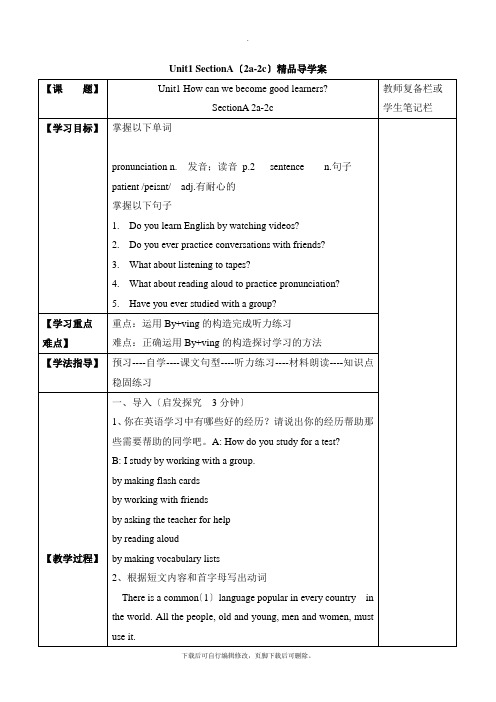
(2).对对方的帮助或要求表示委婉谢绝时,一般用:
◆ I don’t think so我认为不是这样◆Sorry, I can’t对不起,我不能◆I’d love to, but…◆ I’m afraid我愿意,但恐怕……
① –What about _______(listen) to some English songs? -- It’s great .
byasking the teacher for help
by reading aloud
by making vocabulary lists
2、根据短文内容和首字母写出动词
There is acommon〔1〕language popular in every country in the world. All the people, old and young, men and women, must use it.
【口诀】:分开是一段,合起是某时;分开s是倍次,合起s是有时
Mr. Green went to Sanya _____________(几次) last summer.
( ) I hope to visit the USA _____ in the future.
A. sometimes B. some times C. sometime D. some time
② Why not ___ your teacher for help when you can’t finish _____ it by yourself?
A. ask; write B. to ask; writing
C. ask; writing D. asking; write
人教版英语九年级全册Unit1 SectionA(3a-3c)精品导学案
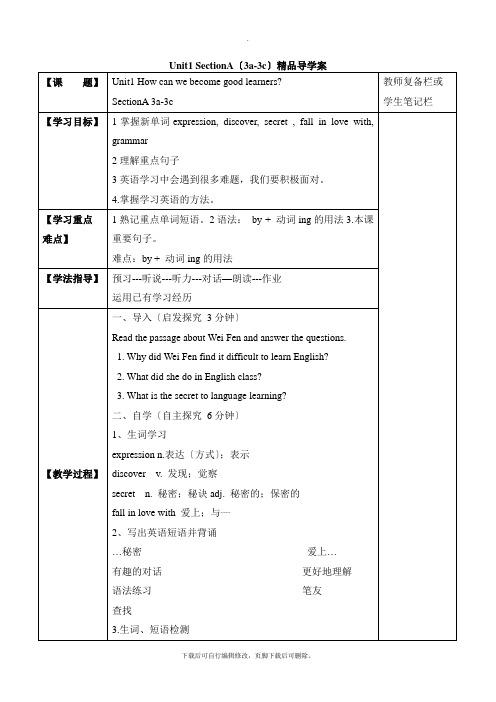
( )2. A. talked B. talk C. sing D. sang
( )3. A. thinkB. believe C. forgetD. understand
( )4. A. either B. neither C. also D. too
足球赛的票_______________________
2.Why did Wei Fen find it difficult to learn English?
find+宾语+adj.+to do sth. .
Wang Dan found it easy to learn English.
写出find的其他用法
II.单项选择
1.-How do you improve your listening?
-I improve it by ________.
A.watch English moviesB.to watch English movies
C.watching English movies D.watches
A. its B. that C.this D.it
III、完形填空
Last year my English class was ____1___for me. First of all, it wasn’t easy for me to understand the teacher when she ___2___to the class. To begin with, she spoke too quickly, and I couldn’t ___3___every word. Later on , I realized it doesn’t matter if you don’t understand every word, ___4___ I was afraid to speak in class because I thought my classmates might laugh ___5__me. I couldn’t always make complete sentences, either. Then I started to ___6___ English-language TV. It helped a lot. I think that doing lots of listening practice is one of the secrets of ___7___a good language learner. Another thing that I found very difficult was English ___8___. So I decided to take lots of grammar notes in every class.
最新人教版九年级英语全一册导学案(全册 共209页)
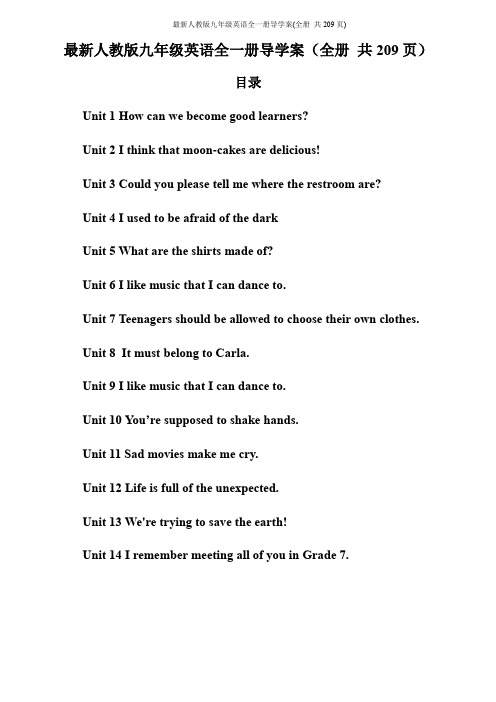
最新人教版九年级英语全一册导学案(全册共209页)目录Unit 1 How can we become good learners?Unit 2 I think that moon-cakes are delicious!Unit 3 Could you please tell me where the restroom are?Unit 4 I used to be afraid of the darkUnit 5 What are the shirts made of?Unit 6 I like music that I can dance to.Unit 7 Teenagers should be allowed to choose their own clothes.Unit8It must belong to Carla.Unit 9 I like music that I can dance to.Unit10You’re supposed to shake hands.Unit 11 Sad movies make me cry.Unit 12 Life is full of the unexpected.Unit 13 We're trying to save the earth!Unit 14 I remember meeting all of you in Grade 7.Unit 1 How can we become good learners?to be patient4. Try to guess a word’s meaning by reading the sentences before and after it.sentence n.Please use this word to make a sentence. make a sentence 五、练评(包含“考点链接” 应用探究 6分钟) 单项选择。
- 1、下载文档前请自行甄别文档内容的完整性,平台不提供额外的编辑、内容补充、找答案等附加服务。
- 2、"仅部分预览"的文档,不可在线预览部分如存在完整性等问题,可反馈申请退款(可完整预览的文档不适用该条件!)。
- 3、如文档侵犯您的权益,请联系客服反馈,我们会尽快为您处理(人工客服工作时间:9:00-18:30)。
(共4套)人教版九年级英语全一册单元导学案集Unit 11Sad movies make me cry.第一课时Section A(1a-2d)Target Navigation【目标导航】Key words and phrases:drive,drive sb. crazy/mad,the more…the more…,lately,be friends with(sb.),leave out,friendshipKey sentences:(1)Sad movies make me cry.(2)I'd rather go to Blue Ocean because I like to listen to quiet music while I'm eating.(3)Waiting for Amy drove Tina crazy.(4)The more I got to know Julie,the more I've realized that we have a lot in common.(5)It makes Alice unhappy because she thinks Julie is now better friends with me than with her.Skills:初步学会谈论事情如何影响你,并表达个人主观感受.Emotion:通过互相谈论“周围的环境或事情如何影响你”,使学生相互了解彼此的内心需求和烦恼,从而培养学生学会关心别人,为别人着想.The guidance of learning methods【学法指导】通过听、说等一些活动培养良好的听力习惯和能力,再通过独学和小组合作,学会把握学习的主要内容,在学习中善于记要点,善于抓住用英语进行交际的机会.Learning important and difficult points【学习重难点】学会运用make sb. do sth./make sb.+adj.的结构表达“某事使某人怎么样”.Teaching Steps【教学过程】Autonomous Learning Scheme【自主学习方案】☞预习指导与检测(一)预习指导1.预习Page 81、82的生词,根据音标会读知意.2.朗读Page 81、82的句子,能英汉互译.(二)预习检测Ⅰ.完成下列短语.1.使某人发疯/发狂________________2.不完全是________________3.与……玩的开心________________4.(性格、爱好等)有相同之处________________5.越……越……________________6.忽略,不包括,不提及________________7.是某人的朋友________________8.听轻音乐________________9.一起度过更多时光________________(Keys:1.drive sb. mad/crazy;2.yes and no;3.have fun with…;4.have…in common;5.the more…the more…;6.leave out;7.be friends with sb.;8.listen to soft music;9.spend more time together)Ⅱ.完成书中第81页1a的练习.Classroom Learning Guidance Scheme【课堂导学案】【探究一】听录音,完成1b.【探究二】小组练习,根据前面听力的内容分角色扮演Amy和Tina的会话.Amy:I'd rather go to Blue Ocean because I like to listen to quiet music while I'm eating.Tina:But that music makes me sleepy.I want to have the hamburgers at Rockin' Restaurant.【探究三】完成书中听力训练2a,2b. 师生核对答案.【探究四】根据2a/2b听力内容,用下面的例子分角色扮演Tina和John之间的对话.John:Did you have fun with Amy last night?Tina:Well…yes and no.She was really late.【探究五】分角色扮演对话,完成2d.【探究六】Summary根据下面的句子,总结make sb. do sth./make sb. adj.的用法和含义:1.Sad movies make me cry.2.That music makes me sleepy.3.Loud music makes John want to dance.4.That can make our friendship stronger.总结:________________________________________________________________________【知识点拨】1.make sb. do sth.“让某人做某事”如:My mom made me clean the room.make sb./sth.+adj.“使某人或某物/某事处于某种状态”如:Make the window open/closed.2.have fun doing sth.做某事有乐趣如:We have fun learning English.我们学英语有乐趣.have fun with sth./sb.和……玩的很开心如:He had fun with his friends.他和朋友们玩的很开心.3.“the more…,the more…”句型常表示“越……就越……”,是一个复合句,其中前面的句子是状语从句,后面的句子是主句. the用在形容词或副词的比较级前,more代表形容词或副词的比较级. 如:(1)The more he gets,the more he wants.他越来越贪.(2) The more she learns,the more she wants to learn.她越学越想学.“the more…,the more…”句型,主从句的时态常用一般现在时或一般过去时. 如:(1)The higher the ground is,the thinner air becomes.离地面越高,空气就越稀薄.(2)The harder he worked,the more he got.他工作越努力,得到的就越多.若主句的谓语动词用一般将来时,从句的谓语动词要用一般现在时表示将来. 如:(1)The harder you work,the greater progress you will make.你越用功,进步就越大.(2)The longer the war lasts,the more the people there will suffer.战争持续得越久,那里的人们受难就越多.若比较级作表语且不位于句首时,可以不用the. 如:When we are more in danger,we should be braver.越是危险,我们越应勇敢.在这种句型中,主句在程度上随着从句变化而变化,常把被强调部分提前. 如:The faster you run,the better it will be.你跑得越快越好.这种句型的特点是前后都可以有所省略. 特别是谚语、俗语,只要意义明确,越简练越好. 如:(1)The more,the better.多多益善.(2)The sooner,the better.越早越好.这种句型中的比较部分通常是状语、宾语、表语,也可以是主语. 如:(1)The more English you practice,the better your English is.你练习英语越多,你的英语就越好.(2)The busier he is,the happier he feels.他越忙越高兴.(3)The more air there is inside the tyre,the greater pressure there is in it.轮胎里空气越多,承受的压力就越大.若表示“越……越不……”时,常用“the more…,the less…”句型. 如:The more she flatters me,the less I like her.她越逢迎我,我越不喜欢她.若表示“越不……就越……”时,常用“the less…,the more…”句型. 如:The less he worried,the better he worked.他越不烦恼,工作就干得越好.4.yes and no(对问题的一种两可回答)既肯定又否定,既是又不是,既好又不好. 如:“Yes and no,”he says.“不完全是,”他说.Classroom Evaluation Scheme【课堂评价案】详见当堂训练部分(即学生用书同步练习题).Teaching Reflection【教学反思】这一节课我们通过听说等活动,以及学生的自主学习和小组合作初步学习用make sb. adj./do sth.的结构表达某事对某人产生影响. 通过互相询问或谈论某事如何影响某人,使学生相互了解彼此的内心需求和烦恼. 从而培养学生学会关心别人,为别人着想. 在这一节课里,学生应该掌握的drive,drive sb. crazy/mad,the more…the more…,lately,be friends with (sb.),leave out,friendship等重点词汇和(1)Sad movies make me cry.(2)I'd rather go to Blue Ocean because I like to listen to quiet music while I'm eating.(3)Waiting for Amy drove Tina crazy.(4)The more I got to know Julie,the more I've realized that we have a lot in common.(5)It makes Alice unhappy because she thinks Julie is now better friends with me than with her.等重点句子都在本节课中顺利完成,收到了很好的效果.第二课时Section A(3a-4b)Target Navigation【目标导航】Key words and phrases:king,power,prime,minister,banker,pale,queen,call sb. in,examine,nor,neither…nor…,palace,wealth,to start with,grey,lemon,uncomfortableKey sentences:(1)The loud music makes me nervous.(2)Soft and quiet music makes me relax.(3)Money and fame don't always make people happy.(4)She said that the sad movie made her cry.Skills:进一步运用Grammar Focus的句型谈论事情如何影响你;同时通过阅读故事让学生讨论什么能真正使人开心,提高学生阅读理解能力.Emotion:通过阅读故事使学生真正从生活中找到什么能使人开心快乐.The guidance of learning methods【学法指导】任务型阅读方法的运用;通过练习、调查、谈论,熟练运用目标语言.Learning important and difficult points【学习重难点】1.任务型阅读“The Shirt of a Happy Man(Part I)”2.进一步熟练运用目标语言.Teaching Steps【教学过程】Autonomous Learning Scheme【自主学习方案】☞预习指导与检测(一)预习指导1.预习Page 83、84的生词和短语,根据音标会读记.2.朗读Grammar Focus的句子,并会用它们谈论事情如何影响你.(二)预习检测完成下列短语.1.很久以前________________2.睡眠很差________________3.feel like eating________________4.首相、大臣________________5.取代某人的位置________________6.高级将领________________7.起初,开始时________________8.在……做得好________________9.考试答题________________10.发回________________11.清扫街道________________(Keys:1.a long time ago;2.sleep badly;3.想要吃;4.prime minister;5.take one's position;6.top general;7.to start with;8.do well in…;9.answer the exam questions;10.hand back…;11.clean up the streets)Classroom Learning Guidance Scheme【课堂导学案】【探究一】小组合作完成3a/3b/3c的阅读练习.1.读故事回答3a的问题.2.从故事中找出与3b中这些短语意思相似的单词或短语.3.与你的小组分角色扮演这个故事.【探究二】同桌互查Grammar Focus中句子的背写情况.【探究三】小组合作完成4a的练习,学会运用“make sb. adj.”.【探究四】完成这个调查,然后再问两个学生:A:What makes you angry?B:When people throw rubbish on the streets,it makes me angry.C:Me,too.It makes me want to tell them to clean up the streets.Classroom Evaluation Scheme【课堂评价案】详见当堂训练部分(即学生用书同步练习题).Teaching Reflection【教学反思】这一节课我们通过任务型阅读活动,使学生真正了解了什么才能使人开心、快乐,药物、权力、金钱、名誉都不能使人开心. 学生通过自主学习和小组合作,完成填空练习和小调查,从而学会运用make sb. adj./do sth.. 在这一节课里,学生主要学习了king,power,prime minister,banker,pale,queen,call sb. in,examine,nor,neither…nor…,palace,wealth,to start with,grey,lemon,uncomfortable等重点单词和短语,并且能够运用重点句子根据小调查谈论某事如何影响某人,同时学生们还根据Grammar Focus总结了Section A的重点句型,收到了很好的效果.第三课时Section B(1a-1e)Target Navigation【目标导航】Key words and phrases:general,power,search for,even though,fame,return toKey sentences:(1)The general finds a happy person with power and money.(2)The general searched for three days and found a happy person.(3)What made the poor man so happy even though he had no power,money or fame?(4)Do you think the general will return to the king with the poor man's shirt?Skills:1.能够通过听录音理解“The Shirt of a Happy Man(Part Ⅱ)”的故事内容.2.能用目标语言讨论那个穷人关于快乐的想法.Emotion:通过听力理解“The Shirt of a Happy Man(Part Ⅱ)”的故事内容,并让学生通过讨论理解快乐的真正含义.The guidance of learning methods【学法指导】听说法、小组合作、讨论法.Learning important and difficult points【学习重难点】1.能够通过听录音理解“The Shirt of a Happy Man(Part Ⅱ)”的故事内容.2.能用目标语言讨论那个穷人关于快乐的想法.Teaching Steps【教学过程】Autonomous Learning Scheme【自主学习方案】☞预习指导与检测(一)预习指导复习Page 83的生词和短语.(二)预习检测Ⅰ.翻译.1.把他的衬衫给国王穿________________2.搜索、搜查________________3.即使________________4.返回到________________5.那个穷人关于幸福的想法________________(Keys:1.give his shirt to the king to wear;2.search for;3.even though;4.return to;5.the poor man's thoughts about happiness)Ⅱ.1a:Look at the possible endings to the story about the unhappy king.Do you think any of these is the right one?If so,which one?Ⅱ.1b:What are some other possible endings to the story?Discuss your ideas with your partner.Classroom Learning Guidance Scheme【课堂导学案】【探究一】完成1c,1d的听力训练.【探究二】你同意那个穷人关于快乐的想法吗?与你的组讨论你的想法. 然后分角色扮演故事的其余部分.Classroom Evaluation Scheme【课堂评价案】详见当堂训练部分(即学生用书同步练习题).Teaching Reflection【教学反思】本节课我们通过听和说的活动继续进一步学习了故事“The Shirt of a Happy Man”的剩余部分,重点复习了单词和短语general,power,search for,even though,fame,return to以及句子The general finds a happy person with power and money.The general searched for three days and found a happy person.What made the poor man so happy even though he had no power,money or fame?Do you think the general will return to the king with the poor man's shirt?学生通过这一节课的学习,已经基本掌握了本节课的重点词汇,能用目标语言讨论那个穷人关于快乐的想法,理解了快乐的真正含义. 我觉得在合作探究方面,通过小组合作学习,学生说英语的胆子越来越大,组与组之间的比赛,激发了学生听课的积极性和学习的欲望,注意力更加集中了,因而学习的效率更高了.第四课时Section B(2a-2e)Target Navigation【目标导航】Key words and phrases:weight,shoulder,goal,let…down,coach,kick,kick sb. off,be hard on sb.,besides,teammate,courage,rather than,guy,pull,relief,nod,agreement, fault,disappointSkills:能够熟练地朗读课文,在阅读中,学会了解成语和短语的意思,学会带着问题有目的地进行阅读.Emotion:通过本节课的学习让学生学会与同桌分享自己快乐和悲伤的经历,学会交流,学会从失败中寻找自信,学会向错误学习.The guidance of learning methods【学法指导】任务型阅读、背记成语和动词短语.Learning important and difficult points 【学习重难点】在阅读中,学会认识惯用语和动词短语,学会带着问题有目的地进行阅读.Teaching Steps【教学过程】Autonomous Learning Scheme【自主学习方案】☞预习指导与检测(一)预习指导1.预习Page 86、87的生词和短语,根据音标会读记.2思考:你曾经犯过错误吗?它使你感觉怎么样?与你的同桌谈论所发生过的事情,完成2a的练习.(二)预习检测根据86页2b完成下列英汉互译.1.注视________________2.生命中最糟糕的一天________________3.校足球场________________4.miss scoring that goal________________5.使……失望________________6.开除________________7.be too hard on oneself________________8.团队的努力________________9.向你的错误学习________________10.与……交流________________11.而不是________________12.齐心协力、通力合作________________13.To his surprise and relief,his teammates all nodded in agreement.________________________________________________________________________14.Besides,winning or losing is only half the game.________________________________________________________________________15.But I think if we continue to pull together,we're going to win the next one.________________________________________________________________________(Keys:1.keep one's eyes on…;2.the worst day of one's life;3.the school soccer field;4.错过进球;5.let…down;6.kick sb. off;7.对自己太苛刻;8.team effort;9.learn from your mistakes;municate with…;11.rather than;12.pull together;13.使他吃惊和得以解脱的是他的队友都同意地点点头. 14.而且,输赢仅仅是比赛的一半. 15.但我认为如果我们继续齐心协力,我们将赢下一场比赛. )Classroom Learning Guidance Scheme 【课堂导学案】【探究一】小组讨论,阅读第86页2b短文,完成2b的阅读练习(读故事按正确的顺序给事件标号).【探究二】同桌互动,再读故事回答问题,完成2c的练习.【探究三】从故事中找出惯用语和短语替换这些句子中划线的部分,完成2d的练习.【探究四】分角色扮演皮特和他父亲的会话,完成2e的练习.【知识点拨】1.stop to do停下来去做另一件事. 如:I stop to have a rest.She stops to listen to the teacher.stop doing停止正在做的事. 如:We stopped talking when the teacher came in.Stop playing! Let's begin our class.2.let down使失望同义词:disappoint,get down,bring down,lower,take down反义词:elevate,get up,bring up,lift,raiselet down的英语解释:fail to meet the hopes or expectations of somebody;move something or somebody to a lower position3.rather…than…和rather than实际上是一样的,同would 连用时,可分开写,也可合写.would rather do A than do B=would do A rather than do B “宁愿……而不愿……”如:She would rather stay at home than go out.=She would stay at home rather than go out.但同prefer连用时,只能合写成:prefer to do A rather than do B “宁愿……而不愿……” 如:He preferred to die rather than surrender to the enemy.他宁死也不愿向敌人投降.单独使用时,rather than“而不是”. 如:This argument aimed at the understanding rather than the emotions.这场辩论针对的是理解而不是感情.Classroom Evaluation Scheme【课堂评价案】详见当堂训练部分(即学生用书同步练习题).Teaching Reflection【教学反思】本节课是一节阅读课,这节课通过引导学生阅读文段,完成阅读理解题,一方面学会带着问题有目的地阅读,另一方面学会记住成语和动词短语. 一节课下来学生基本上能够熟练地朗读课文. 这节课由于我在课前精心设计好阅读的思路,课堂上再通过由浅入深的问题引导,这样就一步步地完成了阅读的任务.第五课时3a-Self CheckTarget Navigation【目标导航】Knowledge goals:(1)学会根据提示用使自己感觉快乐和悲伤的经历写故事.(2)运用make sb. adj.句式熟练地谈论某事如何影响你的话题.(3)掌握并运用关于某事如何影响你的短语.Skills:能够熟练地运用本单元的重点句型和语法点.Emotion:通过本节课的学习,了解某事如何影响你的用语,并通过交流写作让学生明白他们什么样的经历最重要.The guidance of learning methods【学法指导】根据提示交流写作;归纳整理笔记法.Learning important and difficult points【学习重难点】重点句型及短语的运用.Teaching Steps【教学过程】Autonomous Learning Scheme【自主学习方案】☞预习指导与检测(一)预习指导熟练掌握本单元单词和短语.1、自读并记忆单词5分钟.2、组内练习,相互提问.(二)预习检测翻译官1.赢/输一场比赛________________2.在考试中得高/差的分数________________3.在一大群人面前表演得好/差________________4.get into a fight with your best friend________________________________________________________________________ 5.your first trip outside your hometown________________________________________________________________________ (Keys:1.win/lose a competition;2.get good/bad grades on an exam;3.perform something well/badly in front of a big group of people;4.开始和你最好的朋友吵架;5.你的首次离家之旅)Classroom Learning Guidance Scheme 【课堂导学案】【探究一】1.思考一些你感觉很开心或悲伤的经历,把这些给你的同桌讲讲,用下列想法帮助你,完成3a的练习.2.用你在3a中的提示写一个与2b相似的故事,根据3b的提示,独立完成.【探究二】Self Check 1把下列词放在表格里适当的位置.【探究三】仿照例子用所给的词写句子,完成Self Check活动2.【探究四】用1-6按最不重要到最重要给六件事标号,根据你的选择写六个句子,完成Self Check活动3.Classroom Evaluation Scheme【课堂评价案】详见当堂训练部分(即学生用书同步练习题).Teaching Reflection【教学反思】这是一节单元小结课,在上本节课之前,一定要让学生熟记本单元重点单词、短语、句子,然后在课堂上,教师要引导学生梳理知识点,通过完成Self Check中的活动任务,让学生对本单元要掌握的知识有一个清晰的思路,同时烂熟于心,然后再通过让学生做学生用书同步练习题巩固所学知识点.Unit 12Life is full of the unexpected.第一课时Section A(1a-2d)Target Navigation【目标导航】Key words and phrases:unexpected,backpack,oversleep,give…a lift,by the time(that)Key sentences:(1)By the time I got up,my brother had already gotten in the shower.(2)When I got home,I realized I had left my keys in the backpack.(3)When I woke up it was already 8:00 a.m.!(4)Before I got to the bus stop,the bus had already left.Skills:能听懂别人叙述过去的事情,能初步运用由when/before/by the time(that)引导的时间状语从句叙述过去的事件.Emotion:通过让学生叙述过去发生的事件,让学生学会倾听,学会关心别人.The guidance of learning methods【学法指导】听说法,小组合作角色扮演.Learning important and difficult points【学习重难点】1.能听懂别人叙述过去的事情.2.能初步运用由when/before/by the time引导的时间状语从句叙述过去的事件.3.掌握Key sentences中的四个句型.Teaching Steps【教学过程】Autonomous Learning Scheme【自主学习方案】☞预习指导与检测(一)预习指导1.预习Page 89、90的生词和短语,根据音标会读记.2.朗读Page 89、90的句子,能英汉互译.(二)预习检测Ⅰ.翻译下列单词、短语和句子.1.在淋浴________________2.某人发生了什么?________________3.把……落在家里________________4.就在……的时候________________5.睡过头________________6.上课迟到________________7.停止运转,不工作了________________8.捎(某人)一程________________(Keys:1.get in the shower;2.What happened to sb.? 3.leave…at home;4.by the time…;5.oversleep;6.be late for class;7.go off;8.give…a lift )Ⅱ.完成书中第89页1a的练习.Classroom Learning Guidance Scheme【课堂导学案】【探究一】初步听录音,完成1b的练习.【探究二】轮流扮演玛丽,看上面的图谈论今天早上所发生的事情,完成1c.【探究三】进一步听录音,完成书中2a,2b的听力练习. 师生核对答案.【探究四】Pair WorkMake up an ending for the story and share it with your partner,finish 2c.【探究五】师生合作完成2d,分角色扮演对话.【知识点拨】1.By the time I got outside,the bus had already left.当我出来时,公共汽车已经离开了.“by the time”表示“当/到……时”,引导时间状语从句. 如果从句中用了一般过去时,主句中常用过去完成时;如果主句中用了将来时,从句中常用一般现在时表将来. 如:By the time I got up,he had already left.当我起床时,他已经离开了.He will be a teacher by the time he is twenty.到他二十岁时,他会成为一名教师.【拓展】by now 表示“到现在为止”,通常与现在完成时连用. 如:By now I have collected 200 dolls.到现在为止,我已收集了二百个布娃娃.【小试牛刀】根据汉语提示完成下面的句子,每空一词.(1)当我到车站时,火车已经开走了.________ ________ ________ I got to the station,the train ________ ________ left.(2)长大后,他会离开这儿.He ________ ________ here by the time he ________ up.(keys:(1)By the time,had already;(2)will leave,grows)2.My alarm clock didn't go off! 我的闹钟没响.go off 意为“发出响声”. 如:Something was wrong with my alarm clock and it didn't go off.我的闹钟出毛病了,它没有响!【拓展】(1)go by意为“(时间)过去;消逝”. 如:Time goes by second by second.时间一秒秒地消逝.(2)go on继续. 如:Please go on working.请继续工作.【小试牛刀】单项选择.—Why were you late this morning?—My alarm clock didn't ______,so I overslept.A.go by B.go on C.go off D.go down(Keys:C)3.Carl's dad saw me on the street and gave me a lift in his car.卡尔的爸爸在街上看到我,捎了我一程.give sb. a lift 是动词短语,意为“捎某人一程”,相当于give sb. a ride/give a ride to sb.. 如:I'm a little late,can you give me a lift,dad? 我要迟到了,你能捎我一程吗,爸爸?【小试牛刀】根据汉语提示完成下面的句子,每空一词.他让我搭便车去车站.He ________ ________ ________ ________ to the station.(Keys:gave me a ride)【达标训练】Ⅰ.单项选择.1.Tom drove by and gave me a ______ on the way home.A.flight B.run C.walk D.lift2.When I got to the cinema,the movie ______ for five minutes.A.began B.had begunC.had been on D.has been on3.She will be a nurse ______ she graduates from the school.A.by the time B.at this timeC.at that time D.at a time4.The alarm is ______.There must be something wrong with the car.A.going on B.going byC.going off D.going down5.I ______ this morning and missed the early bus.A.overslept B.slept C.held D.caught(Keys:1-5DCACA)Ⅱ.根据汉语提示完成下面的句子,每空一词.1.他醒来发觉自己在医院里.He ________ ________ and found himself in hospital.2.看!那些孩子正向学校飞奔.Look! The children are ________ ________ to school.3.他穿上大衣走了出去.He ________ ________ his coat and went out.4.你每天应该至少刷两次牙.You should brush teeth ________ ________ twice a day.5.他踩了我的脚,甚至连一声“对不起”都没有说.He ________ ________ ________ “sorry” when he stepped on my toes.(Keys:1.woke up;2.running quickly;3.put on;4.at least;5.didn't even say)Classroom Evaluation Scheme【课堂评价案】详见当堂训练部分(即学生用书同步练习题).Teaching Reflection【教学反思】本节课是第十二单元的起始课,通过听和说的活动让学生学会用when/before/by the time 引导的时间状语从句谈论过去的事件,学生在这节课中要掌握的重点单词、短语“unexpected,backpack,oversleep,give…a lift,by the time(that)”和重点句型“By the time I got up,my brother had already gotten in the shower.When I got home,I realized I had left my keys in the backpack.When I woke up it was already 8:00 a.m.!Before I got to the bus stop,the bus had already left.”都得到了很好的落实. 在处理课堂导学案的过程中,我觉得学生合作探究活动能否顺利完成,关键在于学生预习得怎么样,课前预习搞好了,课堂中我再采用一些激励机制,比如分组竞赛、小组合作等方式,课堂气氛就活跃起来了,学生们跃跃欲试,争先恐后,一节课的任务在不知不觉中就完成了.第二课时Section A(3a-4c)Target Navigation【目标导航】Key words and phrases:block,worker,above,burn,alive,airport,till,west,cream,workday,pie,show up,bean,market,by the end ofKey sentences:(1)When I got to school,I realized that I had left my backpack at home.(2)By the time I got back to school,the bell had rung.(3)Before I got to the bus stop,the bus had already left.(4)I was about to go up to my office when I decided to get a coffee first.(5)As I was waiting in line with the other office workers,I heard a loud sound.Skills:1.进一步运用由when/before/by the time引导的时间状语从句叙述过去的事件. 2.通过任务型阅读,完成回答问题、找反义词、改写等练习.Emotion:通过阅读“Life Is Full of the Unexpected”,让学生认识到好事情会变成坏事情,坏事情也会变成好事情.The guidance of learning methods【学法指导】任务型阅读;练习归纳.Learning important and difficult points【学习重难点】进一步掌握由when/before/by the time引导的时间状语从句叙述过去的事件.Teaching Steps【教学过程】Autonomous Learning Scheme【自主学习方案】☞预习指导与检测(一)预习指导1.预习Page 91、92的生词和短语,根据音标会读记.2.朗读Grammar Focus的句子,归纳主从句时态.(二)预习检测翻译.1.世贸中心________________2.be about to________________3.go up________________4.my favorite coffee place________________5.排队等候________________6.怀疑地凝视着________________7.think to oneself________________8.hear about________________9.the day before________________10.end up doing sth.________________11.show up________________12.Life is full of the unexpected.________________13.My bad luck had unexpectedly turned into a good thing.________________________________________________________________________(Keys:1.the World Trade Center;2.即将,将要;3.上去;4.我最喜爱的咖啡地;5.wait in line;6.stare in disbelief;7.思量;8.听说;9.前一天;10.以做某事告终;11.赶到,露面;12.生活中充满了意外. 13.我的坏运气竟然变成了一件好事. )Classroom Learning Guidance Scheme【课堂导学案】【探究一】小组活动1.初步阅读完成3a练习:(1)Which two events does the writer mention?(2)How did the writer end up missing both events?2.进一步阅读完成3b的练习:从文段里找到与下列词意义相反的词,然后为每一个词写一个句子.3.读后完成3c的练习:复述你的同桌的一个事件. 用3c的词或短语来帮助你.【探究二】阅读Grammar Focus的句子,注意主从句的时态.【探究三】学生完成4a部分的练习,感知by the time/before引导的时间状语从句.【探究四】学生完成4b部分的练习,进一步了解时间状语从句中主句的时态并尝试运用.【探究五】Group work完成4c的练习并展示成果,用时间状语从句表达.【知识点拨】1.We stared in disbelief at the black smoke rising above the burning building.我们难以置信地看着燃烧的建筑物升起的黑烟.burn 动词,有两个基本意思:(1)燃烧;点燃;发光如:She burnt a candle.她点燃了一根蜡烛.We burn coal to keep warm.我们烧煤取暖.(2)烧伤;烧焦;烫伤;晒黑如:The child got burnt while playing with fire.那小孩玩火时,把自己烧伤了.【拓展】(1)burn away烧掉如:Half of the candle had burnt away.蜡烛已烧掉一半了.(2)burn down 渐渐烧完如:The room grew colder as the fire burnt down.随着炉火逐渐减弱,屋里越来越冷.【小试牛刀】根据汉语提示完成下面的句子,每空一词.(1)她的信已经烧了.Her letters have ________ ________.(2)他的手在炉子上烫伤了.He ________ ________ ________ on a hot stove.(Keys:(1)burnt away;(2)burnt his hand)2.I felt lucky to be alive.我感到很幸运能活下来.辨析:alive,living,live与livelyalive“活着,活的,有生命的,还出气的”,可指人也可指物,可作表语、后置定语、宾补.living“活着,尚在人间,健在的”,指人或物,作定语或表语.live“活着的,活生生的”,指物,不指人,作定语.lively“活泼的,活跃的,充满生气的”,可指人,也可指物,作定语、表语或宾补.【小试牛刀】单项选择.(1)Jin Yong is one of the greatest and oldest ______ writers.He is still ______.A.living;alive B.living;liveC.alive;living D.alive;lively(2)—Is his grandmother still ______?—Yes,she is 102 years old!A.live B.living C.alive D.lively(Keys:(1)A;(2)B)3.The other planes were full so I had to wait till the next day.别的飞机也满员了,因此我不得不等到第二天.till 意为“到,直到”,相当于until.(1)用于肯定句时,主句的动词只用延续性的,它所表示的动作一直延续到till或until表示的时间为止,意为“直到……为止”. 如:She watched TV till her mother came back.她看电视直到她母亲回来.(2)用于否定句时,主句的动词一般是非延续性的,也可以是延续性的,它所表示的动作直到till或until所表示的时间才发生,意为“直到……(才)”. 如:She didn't watch TV till her mother came back.直到她母亲回来她才(开始)看电视.【小试牛刀】单项选择.(1)I didn't believe he could drive ______ he told me.A.once B.while C.since D.till。
